Sonya Barsness
Reprinted from Being Heard: The Voice of a Revisionary Gerontologist, July 30, 2021
I think we agree that nursing homes* need to change.
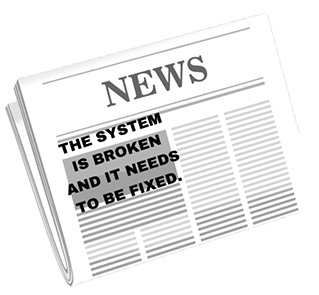
Right?
It seems that whenever I read something about nursing homes, and what we have learned from COVID, this message prevails.
I can’t stop thinking about all the people who right now are living and working in nursing homes. I cannot give up on them. They deserve better.
Yet. How do we move forward? How do we fix it?
We can agree that there are many elements of this system that are problematic. The reimbursement system is not built to adequately care for people with multiple chronic conditions. It definitely does not adequately care for people living with dementia. There is a serious workforce crisis, and that extends to the reality that we do not sufficiently pay direct care professionals. There is a regulatory system that is confusing and overwhelming to people, and paradoxically it is at times over-enforced and under-enforced. Some nursing homes get citations for leaving bananas out too long, and some homes that are actively neglecting and abusing people have minimal repercussions.
Okay. Agreed?
However, when we talk about fixing nursing homes, there are other problematic things that I hear less about. And they are related to the paradigms that surround nursing homes.
What do I mean by paradigm? A system of beliefs, ideas, values, and habits that is a way of thinking about the real world. These beliefs, ideas, values, and habits are at the root of why nursing homes are the way they are.
What are some of these problematic paradigms?
- The paradigm in nursing homes that the best we can do is maintain people.
- That people are too sick to have meaning and purpose.
- It is not the job of nursing homes to create opportunities for meaning and purpose.
- The paradigm that, for older people in nursing homes, well-being is really defined by the absenceof things like hospitalization, pressure ulcers, “challenging behaviors” and not the presence of things like joy, meaning, etc.
- There is the paradigm of safety at all costs, which is maybe partly driven by liability, but is likely also about our discomfort with older people making “bad decisions” even if it is want they want.
- There is the paradigm in which the “experts”, professionals, and policy drive how the system looks and acts, not the people who are supported by the system.
- There is the paradigm of feeling the pressure to only do those things for which there is an “evidence base” but also doing plenty of things for which there is no evidence base, sometimes at the expense for what might be helpful to an individual.
- There is the paradigm of focusing more on keeping people alive, but less on howthey are living.
So, as we keep having these important, necessary discussions about how nursing homes have to change, I plead that we keep some of these other problematic, more paradigm-y things in mind. No, more than that. Can we try to lead with a NEW paradigm? Truly build a system that is driven by a new paradigm.
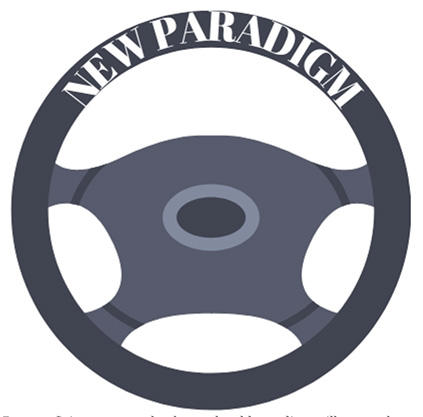 Because fixing a system that keeps the old paradigm will not work.
Because fixing a system that keeps the old paradigm will not work.
Case in point, we have been trying to sneak a new paradigm, based on person-centered values, into the existing system for so many years now. But it has been hard to really grow this new paradigm in the current system. That is because it is not at the root of the system. If we want to fix nursing homes we need to go back to the root, and think about the foundation we need to build for a new paradigm.
What would this look like?
What if the foundation of nursing homes was a focus on LIVING, meaningful living?
What if the foundation of nursing homes included palliative care philosophy? Palliative care is “comprehensive, interdisciplinary care that aims to relieve suffering and improve quality of life for people with advanced illnesses and their families.”
What if the foundation of nursing homes was multi-dimensional well-being, especially emotional well-being?
What if the foundation of nursing homes truly included the voices of people who live in them? At every level.
Think about how nursing homes would look different if these foundational values were their purpose.
Let’s step back.
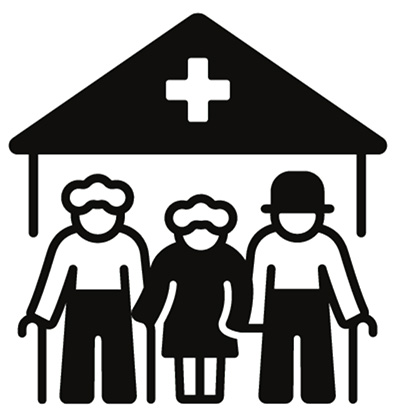 We might ask ourselves, what is the purpose of a nursing home?
We might ask ourselves, what is the purpose of a nursing home?
Answers might be: to keep people safe, to treat their medical conditions, to do the things for them that they can no longer do for themselves.
These are not invalid answers. These answers have driven the creation of the system we see. But do they really answer this question of what is the purpose of a nursing home? As we are fixing the system can we envision a new purpose?
Couldn’t the purpose of a nursing home be to create a place where a person can LIVE their life, with the various supports they need to do that?
Couldn’t the purpose of a nursing home be a supportive community that is driven by what people CAN do, and want to do?
Couldn’t the purpose of a nursing home be a comforting place?
Couldn’t the purpose of a nursing home be to create a place where people can have every opportunity for well-being? Sort of like a one-stop shop for well-being. A well-being festival.
What else could be the purpose of a nursing home?
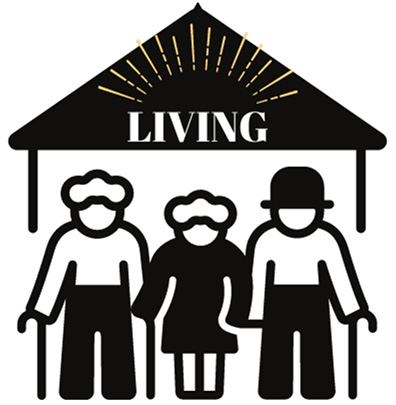 Okay, you might be saying to yourself, that’s nice, but how do we do these things and care for really sick people? We might start by not first thinking about nursing home residents as sick people, but people, who also have medical needs. They also have other needs. Some of those other needs might even be more important to them. We might also ask ourselves what people really need, even people with medical, physical, or cognitive challenges.
Okay, you might be saying to yourself, that’s nice, but how do we do these things and care for really sick people? We might start by not first thinking about nursing home residents as sick people, but people, who also have medical needs. They also have other needs. Some of those other needs might even be more important to them. We might also ask ourselves what people really need, even people with medical, physical, or cognitive challenges.
Maybe you are thinking, if we do not elevate the importance of medical needs, how can we trust that they will be met? How will we ensure that people are not neglected?
I am not suggesting that we do not do these things – provide safety and security, medical care, daily support. These things are necessary so that a person can live well. But they are not the driving purpose. And they are not the paradigm under which we make every decision for a person.
We have to think about the purpose of nursing homes, and the paradigm we want to adopt and apply, before we try to fix nursing homes.

Why is it important to think about paradigm before we fix? Here are some examples.
We talk about fixing the reimbursement system. But perhaps we need to first have clarity on what type of care and support the reimbursement system is financing. The reimbursement system would look different depending on the purpose of nursing homes. If nursing homes were driven by the need to ensure multi-dimensional well-being, including emotional well-being, the reimbursement system would look different than a system that seeks to only treat the medical conditions of people. What is the foundational paradigm upon which we create a new reimbursement system?
We talk about fixing the physical structures of nursing homes. Recently, infection control has become an important impetus for us to rethink how the physical environment of traditional nursing homes needs to change. From a medical, infection control perspective, smaller homes and private rooms are better for people living in nursing homes. Yet, there are other things we need to think about. If nursing homes are places where people can experience community, how would nursing homes look to encourage community? Would they be in commercial lots or in neighborhoods? If nursing homes are places where people can find opportunities for meaning, are they physically proximal to possible sources of meaning, whether it be nature, children, animals, the arts? If nursing homes are places where people with dementia can live autonomously, how do we design them so that people with dementia can walk freely within and outside them? What is the paradigm upon which we design nursing homes?
We talk about fixing the regulation system. But one might argue that the regulation system does exactly what is was intended to do. It enforces a system of care that is built on a paradigm of the primacy of medical care. What would a regulation system look like that ensures that people truly have well-being? That their emotional needs drive their daily lives just as much as their daily care needs. That their social needs are at least as important as their medical needs. What is the paradigm that needs to drive a new regulation system?
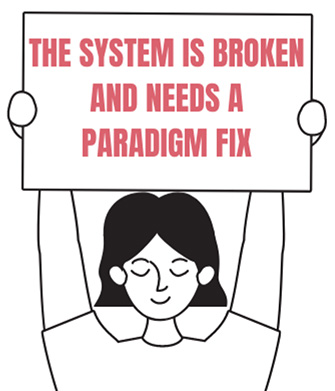 We talk about the high acuity of nursing home residents with the paradox that the current system does not adequately support them, and that this high level of acuity is also what prevents us from not having a medical model. Yet, we need to consider that these individuals would not necessarily fare worse in a system that puts their overall well-being ahead of just their medical needs, and facilitates for them a good life. They might even do better. What is the paradigm that needs to drive how we support people with multiple, chronic conditions in nursing homes?
We talk about the high acuity of nursing home residents with the paradox that the current system does not adequately support them, and that this high level of acuity is also what prevents us from not having a medical model. Yet, we need to consider that these individuals would not necessarily fare worse in a system that puts their overall well-being ahead of just their medical needs, and facilitates for them a good life. They might even do better. What is the paradigm that needs to drive how we support people with multiple, chronic conditions in nursing homes?
How do we move forward to fix nursing homes? It seems that we agree on the problems. I am not sure if we agree about the problematic paradigms that drive nursing homes. Or, the new paradigm that we need to adopt and apply. I am not sure we have even really allowed ourselves to think deeply about a new paradigm, because we have been thinking so long about how we can’t do it in our current system.
What I am sure about is that it is time to think about the paradigm on which we will create a new system. The current system does not work. Fixing it without fixing the paradigm is not going to work either.
*Although I am mostly referring to “long-stay” nursing home levels of care, there are certainly challenges with “short-stay” or rehab. Also, although I am talking here about nursing homes, other types of care communities need to change too, like senior living.



Every person has a gift or gifts. The volunteer ombudsman should be allowed to offer these gifts to the residents of the homes to which they are assigned. These gifts allow residents to feel like a “normal” person. For example; I teach golf. I wanted to bring in a putting green, putter, and golf balls to play with residents, have fun, and challenge them to improve their skills every week. I was even going to bring in prizes for the weekly champion. This was not permitted. How many other volunteers have skills that residents would love to be involved with and to look forward to? I want to provide activities that stimulate their minds and bodies. Another option is that those skills could be taught to care givers who then teach the residents.
Fired up by your writing, I’m moved to say, from the bottom of my heart:
Accessible, leisurely reading must be a part of the transformation. Reading is one of the last abilities to go in the course of dementia. Yet standard published material is unreadable to most LTC/AL residents. And so they sit. This independent, preserved ability to nurture their own personal growth, to bring vitality into their minds, and to transcend their bodily space, lays dormant and wasted because we don’t bother to offer them reading material adapted for their needs. UNESCO says, “Reading is a democratic, human right, and a necessity to quality of life.” We can do this and we should do this. For them, of course, but also for our future selves.
Thanks, Susan. In so many ways, the paradigm shift has to be on every level of promoting LIVING for people. Reading would be one of those things that is such an important part of life, and we should do everything we can to ensure it is available and accessible. When I think of the importance of reading in my life, its absence would leave such a hole in my well-being. And I can’t help thinking also of the “ceremony” of reading for me – getting a cup of tea or coffee, or even a glass of wine, and settling comfortably in a chair, in a quiet space, to read. Can we make sure people in long-term care have access to this?
I’ve been working on tapping into the reading capacities of people living with cognitive changes, and changing the conventional mindset of our field, for almost a decade. Yet I’ve never given conscious thought to the comfort of “setting up” for reading. The quiet dignity of the pre-reading process. I’ve seen it without seeing it. Elders adjusting their glasses, scanning the material, clearing their throats, and they begin: with an air of leadership, seriousness, and maybe a touch of an entertaining spirit.
Thank you for this insight, Sonya!
A wonderful beginning: respecting the humanity and personhood of residents. The paradigm, the set of beliefs we first brought to nursing homes, was the idea that they were places people entered to receive medical care. As long as we call them ‘nursing homes’ we probably won’t escape the old, failing paradigm. The culture change movement opened our thinking, but not the reality of what care homes should be like.
I would start building a new paradigm by looking at the people who live in long-term care homes. Most, but not all, are elderly. But some are younger persons with chronic conditions that make it challenging for them to live independently. It seems essential to acknowledge that the residents (or citizens, as Verna Cavey importantly reminded us in August) of long-term care homes are dependent on others, to a lesser or greater degree, for help with the tasks of daily living. The common denominator is that persons living in long-term care homes need assistance from others to perform the usual tasks of daily living. (Then again, who doesn’t?) Residents’ dependence is on a spectrum, with some persons needing minimal help and others needing total care.
How do we design and fund care homes which serve persons with a variety of needs and abilities and whose individual needs change over time? How to meet each person’s needs, nourish each person’s abilities and make use of their gifts? Homogenized or diverse? Do we want to segregate those who are more dependent from those with a greater range of functionality, or to integrate them?
This is where I might begin thinking about a new paradigm for care homes: by bearing in mind that long-term care homes are by nature labor-intensive, and that we owe the same level of attention to the needs of staff as we do to those of residents.
Wow, Donna, these are all such great questions we need to reflect upon. These are the questions we need to be asking! I 100% agree that a new paradigm needs to give the same care to the people who work in long-term care. They are FOUNDATIONAL to a new paradigm.
Thank you, Sonya. I hope we’ll hear more about the paradigm(s) you develop. To me it comes down to quality staffing, which comes down to creative compensation plans, which requires new funding paradigms.
Well said, and I agree 100% ! I have dreamed of what I would do to create a meaningful environment for our loved ones to continue to LIVE, LOVE AND BE LOVED, LAUGH, MADE TO FEEL IMPORTANT, AND BE AT PEACE WITH WHERE THEY ARE AND WHO THEY ARE. Sure some have great needs medically , physically, mentally but they are still who they were and are, grandmother/grandfather, momma /daddy, husband/ wife, sister/brother, leaders in our community, teachers, factory workers, farmers, engineers, etc. with so much to life to live or maybe so little……and that is what we should focus on. Too much time spent on paper compliance, leaving too little time on what is most important.
I love that Elizabeth – LIVE, LOVE AND BE LOVED, LAUGH, MADE TO FEEL IMPORTANT, AND BE AT PEACE WITH WHERE THEY ARE AND WHO THEY ARE.
Thank you for sharing your passion and inspiring us.
What a great article . So many facilities are so intense on changing the environment but not changing their culture on how residents or elders are treated. They remain so task oriented to follow regulations to prevent deficiencies that they forget the people we serve. When teaching about dementia, I try to have the staff understand how important it is to maintain their routines that they have establish for years. This helps in preventing behaviors but also allows them to see we are treating them as a person and understand their needs. Palliative care was mentioned as treating the whole person not just the medical needs. Emotional needs and being treated as a person is more important to them then a having a bath everyday. Sorry I ramble on but the feelings of the resident are important to me.
Hi Teresa,
I agree that it is so important we move beyond medical needs to what a PERSON needs. When I think about a meaningful day, my personal care needs are not the primary drivers of what makes it meaningful! They do facilitate me having a meaningful day, maybe, but are not the focus!
This is one of the most thoughtful articles I have read. As a long-term care ombudsman I am well aware the system is broken and must be fixed. the points brought up in this piece will help me change the thinking not only of providers but also of advocates and their approaches to meeting the needs of residents while also bettering the quality of their lives.
Thank you, Francine. This is high praise indeed, given your immense experience! Thank you for what you do and have done to change the paradigm. I would love to hear more of your thoughts – you can email me at sonya@sbcgerontology.com if you would like!